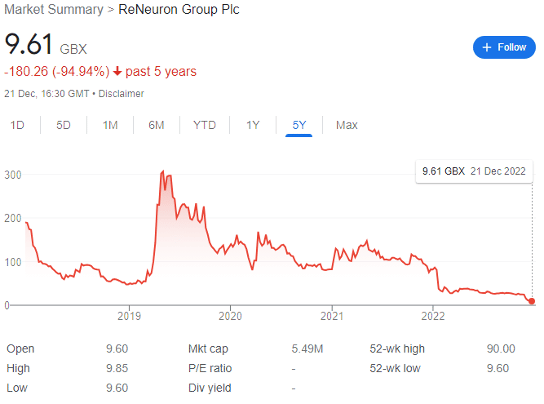RENE shares have gone from being a FTSE AIM favourite to collapsing by 95% over the past five years. But a moderate recovery is not impossible in 2023.

ReNeuron (LON: RENE) shares were at one point one of the hottest UK biotech stocks, soaring to over 300p at several points during mid-2019. But the FTSE AIM company has a frustrating habit of promising jam tomorrow — a not uncommon trait for smaller biotechs, but one that can become infuriating over time.

However, despite the risks, RENE could now be an undervalued play for investors prepared to take the risk of losing their entire stake. For context, Liberum has an 85p target on the stock, Allenby Capital a 72p target, and Edison a 77p target.
ReNeuron science: explain like I’m twelve
Unlike the current most popular biotech FTSE AIM share — Avacta — the science behind ReNeuron is not easy to break down for non-specialists (and I count myself as one of those).
Nevertheless, as a basic summary the company has two platforms:
ReNeuron’s stem cell Exosome Technology platform offers a delivery system for multiple payloads such as siRNA, mRNA, proteins, small molecules, and genes. The company’s proprietary cell lines work by producing a panel of distinct tissue matched Exosome drug delivery candidates.
RENE’s Conditionally Immortalized Induced Pluripotent Stem Sell platform uses pluripotent stem cells capable of self-renewal and the ability to develop into any cell type. Data from the company’s human neural stem cell line shows the cells can be reprogrammed to pluripotency. This allows for production of specific exosomes, cell-based therapeutics, or allogeneic cells of choice.
RENE also has two clinical stage stem cell therapy candidates:
First, the Human Retinal Progenitor Cell Line, developed for the treatment of retinal diseases. The treatment is currently undergoing a promising, Phase 1/2a US-based clinical study.
The second is its Immortalized Neural Progenitor Cell line, developed to help improve the symptoms of patients who have suffered a stroke. While it saw positive Phase 2 data, the company has paused further trials in favour of progressing the programme through regional partnerships.
Both candidates are out-licensed to Fosun Pharma in the China and are now also available for out-license outside of China. Its ultimate revenue strategy is to out-licence its therapies to multiple commercial partners if clinical trials conclude in its favour.
Finance and recent developments
In H1 results, RENE saw revenue climb to £438,000 from £58,000 in the same half last year, with most of this revenue increase coming from a technology transfer and supply agreement with Fosun Pharma. Operating costs were reduced to £4.7 million, down from £6.1 million as the company reduced clinical trial operations.
And most importantly, it ended the half with a gross cash position of £10.5 million, enough to fund operations until circa this time next year. For context, this is almost double RENE’s current market cap.
ReNeuron has signed a Supplemental Terms Agreement with Fosun Pharm for the tech transfer of its platforms into China, and while it has received £320,000 thus far, it expects a further £680,000 over the next two years. Notably, the FTSE AIM company believes that there is potential ‘to receive up to £5 million over the medium to long term, with further potential milestone payments of up to £74 million linked to the main agreement signed in 2019.’
However, while the company needs additional cash, it acknowledges that it is not attractive enough to investors to complete a successful equity raise. The share price fell by 35% in the two days after half-year results were released, and there is a fair question over its long-term health. Several high-profile long-term investors have exited, potentially over these concerns.
But elevated risk always comes with enlarged rewards.
There’s been significant management change in recent months: former CFO Catherine Isted is now CEO, John Hawkins is the new CFO, Dr Randolph Corteling is on board as Chief Scientific Officer, Suzanne Hancock as COO, and Simon Dew as Chief Business Officer.

I’m focussing on Isted: she was a key part of the finance leadership team at Oxford Biomedica during the company’s share price boom up to October 2021 and was previously a partner at both Peel Hunt and Nomura Code. At Oxford Biomedica, she was instrumental in raising more than £110 million for the company, was there as it grew in value by 800%, and saw it enter the FTSE 250 as a key producer of the AstraZeneca vaccine.
In addition, she’s both a research chemist and CIMA qualified accountant. This is only speculation, but a candidate of Isted’s calibre would not accept a promotion to CEO in order to tie her flag to a sinking ship.
Most recently, on 8 December the company presented new data from its collaboration with University College London on the advantages of its induced pluripotent stem cells at a major industry conference.
Corteling argued that the data ‘really highlights the potential for the use of ReNeuron’s proprietary conditionally immortalised iPSCs in the treatment of peripheral nerve damage repair and the development of ‘off the shelf’ stem cell-based therapies.’
Any clinical success could see a quick company acquisition at a modest premium.
Of course, this is a very brief overview of an out-of-fashion FTSE AIM biotech company. But a cash runway of a year, a refreshed leadership team, and two potentially valuable — though as yet mid-trial — platforms are reason enough for me to take a speculative position at under 10p per share.
At least as a stocking filler.
This article has been prepared for information purposes only by Charles Archer. It does not constitute advice, and no party accepts any liability for either accuracy or for investing decisions made using the information provided.
Further, it is not intended for distribution to, or use by, any person in any country or jurisdiction where such distribution or use would be contrary to local law or regulation.
